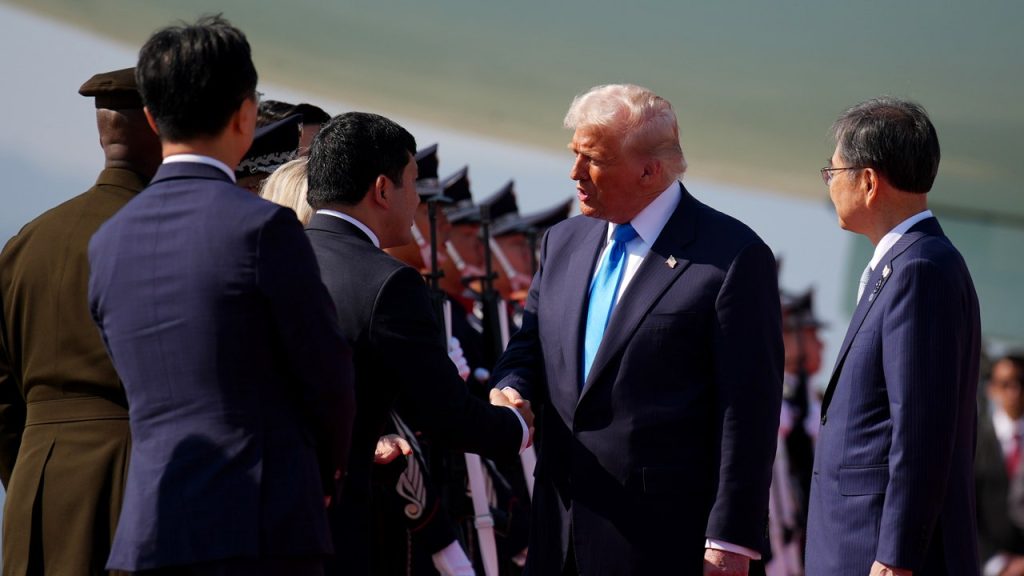Trump’s Remarks on Military Deployment Raise Constitutional Questions
President Donald Trump made headlines during his journey to the Asia-Pacific Economic Cooperation summit in South Korea, where he spoke candidly about his perceived presidential powers while aboard Air Force One. As he prepares for important diplomatic meetings with Chinese President Xi Jinping, Trump’s comments about potentially deploying military forces into American cities have sparked significant concern about constitutional boundaries and executive authority. Speaking to reporters, the President asserted that he possesses broad powers to deploy not just the National Guard, but potentially all branches of the military domestically if he deems it necessary, stating boldly that “the courts wouldn’t get involved” and that he’d be “allowed to do whatever I want” in such scenarios.
These statements come at a time when the relationship between federal and state powers is already under scrutiny. While Trump acknowledged he hasn’t yet needed to take such drastic measures because “we’re doing a great job without that,” his comments highlight a controversial interpretation of presidential authority that many legal scholars would likely dispute. The President specifically mentioned San Francisco as a potential target for federal intervention, claiming his administration was “all set to go last Saturday” but held back after local leaders requested the opportunity to address issues themselves. Trump expressed confidence that federal intervention “would go a lot quicker and it’s much more effective,” suggesting his administration could have “solved that problem in less than a month” – though he didn’t specify exactly what problem he was referring to.
Trump’s remarks reflect a broader tension between his administration’s vision of federal authority and traditional interpretations of the Constitution’s limits on presidential power. The Posse Comitatus Act, passed in 1878, generally prohibits the use of federal military personnel to enforce domestic policies within the United States. While there are exceptions, including those outlined in the Insurrection Act, the deployment of military forces on American soil remains a sensitive constitutional issue with significant historical precedent. The President’s casual assertion that courts would not intervene contradicts the fundamental principle of judicial review that has been established in American jurisprudence since Marbury v. Madison in 1803, where the Supreme Court established its authority to review the constitutionality of legislative and executive actions.
The President also highlighted what he described as progress in reducing crime in certain areas, particularly Memphis, which he claimed has seen crime rates drop “almost 70%, 60-70%,” and predicted would have “almost no crime” within “two or three weeks.” While crime reduction is certainly a priority for most Americans, these specific claims would benefit from factual verification, as dramatic crime reductions of this magnitude in such short timeframes would be historically unprecedented in major American cities. The President’s willingness to consider military deployment for domestic law enforcement represents a significant departure from traditional approaches to federalism and raises questions about the appropriate boundaries between federal and local authority in addressing public safety concerns.
Beyond the constitutional questions, Trump’s comments touch on the political divide over federal versus state authority – a debate that has historically seen Republicans advocate for states’ rights and Democrats push for stronger federal oversight, though these positions often reverse depending on which party controls the White House. The irony is that Democrats now appear to be championing states’ rights to resist federal intervention, while the Republican president asserts expansive federal authority. This political role reversal demonstrates how principles of federalism are often viewed through partisan lenses, with positions shifting based on political expediency rather than consistent constitutional interpretation.
While domestic issues dominated the impromptu press conference, it’s worth noting that the President’s primary purpose for his international trip is diplomatic engagement, particularly his scheduled meeting with Chinese President Xi Jinping. That upcoming discussion is expected to cover critical issues including fentanyl trafficking, trade policy, and border security – all matters of significant importance to American interests. The juxtaposition of Trump’s controversial domestic statements against the backdrop of sensitive international diplomacy highlights the complex interplay between domestic politics and foreign policy that defines modern presidencies. As the President continues his international engagements, the constitutional questions raised by his comments on military deployment will likely continue to provoke debate among legal scholars, politicians, and citizens concerned about the proper limits of executive power.


